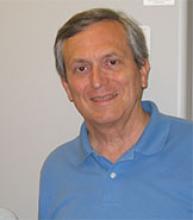Laboratory of Clinical Immunology and Microbiology
Robert Munford, M.D.
Special Volunteer
Scientist Emeritus

Major Areas of Research
- Host inactivation of bacterial lipopolysaccharides (LPS, “endotoxins”) by an essential animal lipase, acyloxyacyl hydrolase (AOAH), that was discovered in our lab
- AOAH’s role in preventing LPS-induced diseases such as colitis, non-alcoholic liver disease (“fatty” liver), and atherosclerosis
- The pathogenesis of “sepsis,” focusing on systemic anti-inflammation as a key component of the body’s response to infection
- Inflammation-inducible gene therapy, producing anti-inflammatory proteins in response to inflammation by using acute-phase promoters in gene therapy vectors
- The strong influence of extracellular pH on macrophage lipid metabolism
Biography
Education
M.D., 1970, Harvard Medical School, Boston, MA
M.A., 1967, Oxford University, Oxford, England
B.A., 1964, Vanderbilt University, Nashville, TN
Selected Publications
Zou B, Goodwin M, Saleem D, Jiang W, Tang J, Chu Y, Munford RS, Lu M. A highly conserved host lipase deacylates oxidized phospholipids and ameliorates acute lung injury in mice. Elife. 2021 Nov 16;10:e70938.
Feng J, Jiang W, Cheng X, Zou B, Varley AW, Liu T, Qian G, Zeng W, Tang J, Zhao Q, Chu Y, Wei Y, Li X, Munford RS, Lu M. A host lipase prevents lipopolysaccharide-induced foam cell formation. iScience. 2021 Aug 19;24(9):103004.
Jiang W, Le J, Wang PY, Cheng X, Smelkinson M, Dong W, Yang C, Chu Y, Hwang PM, Munford RS, Lu M. Extracellular Acidity Reprograms Macrophage Metabolism and Innate Responsiveness. J Immunol. 2021 Jun 15;206(12):3021-3031.
Munford RS, Weiss JP, Lu M. Biochemical transformation of bacterial lipopolysaccharides by acyloxyacyl hydrolase reduces host injury and promotes recovery. J Biol Chem. 2020 Dec 18;295(51):17842-17851.
Lu M, Kho T, Munford RS. Prolonged triglyceride storage in macrophages: pHo trumps pO2 and TLR4. J Immunol. 2014 Aug 1;193 (3): 1392-1397.
Lu M, Munford RS. The transport and inactivation kinetics of bacterial lipopolysaccharide influence its immunological potency in vivo. J Immunol. 2011 Sep 15;187(6):3314-20.

